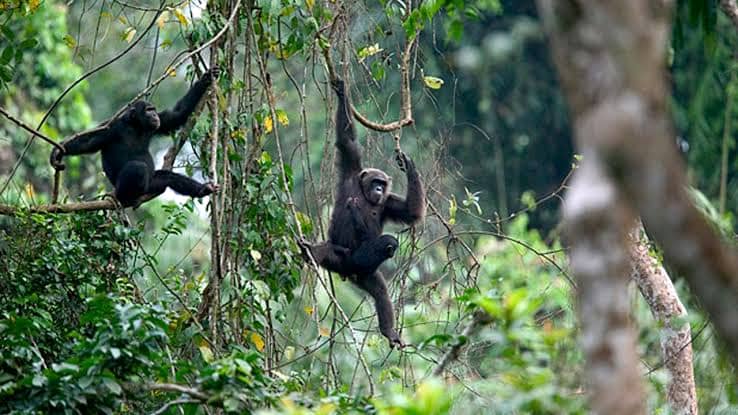Afi Mountain Wildlife Sanctuary
Introduction
Afi Mountain Wildlife Sanctuary is located in Cross River State, southern Nigeria, covering an area of 104 km² (40 sq mi). Established in 2000, its primary purpose is to protect endangered animal species, notably the Cross River gorilla, the Nigeria-Cameroon chimpanzee, the drill, and the gray-necked rockfowl. The sanctuary is managed by the Cross River State Forestry Commission and the Ministry of Climate Change and Forestry.
Despite its steep and rugged terrain providing natural protection against logging, the sanctuary is often damaged by dry-season bush fires, typically set to clear land for agriculture or to hunt game. These open, burned areas are quickly colonized by herbaceous plants, which serve as a staple food source for gorillas. The western section of the sanctuary is notable for being the largest African wintering ground for the European swallow, with an estimated 20 million birds roosting in the area. Sixteen communities, with a combined population of approximately 27,000 people, surround the sanctuary.
Ecological Significance
Wildlife sanctuaries like Afi Mountain are critical for biodiversity conservation and ecotourism. These areas preserve essential ecosystems and serve as habitats for diverse fauna, particularly mammalian herbivores. However, human activities such as illegal logging, farming, and urban expansion pose significant threats. Habitat degradation and deforestation, in particular, are major contributors to species extinction.
Mammalian herbivores, vital to ecosystem dynamics, are classified into grazers (grass and forb feeders) and browsers (woody vegetation feeders). They function as indicator species for land use changes. In Nigeria, habitat loss and degradation, driven by anthropogenic activities, have significantly reduced biodiversity.
Climate and Vegetation
The sanctuary receives annual rainfall between 3,000 mm and 3,800 mm, increasing with altitude. The rainy season spans March to September, and the dry season from October to March. Average temperatures vary from 22.2 °C on the mountain to 27.4 °C in lowland areas. The vegetation is characterized by tropical high forest, with tree species such as Pterocarpus osun, Albizia zygia, Parkia bicolor, Pycnanthus angolensis, Irvingia gabonensis, and Monodora myristica.
Key Wildlife Species
White-throated monkey (Cercopithecus erythrogaster)
This critically endangered primate is protected under Nigeria's Endangered Species Decree No. 11 of 1985. It is arboreal and diurnal, with a diet of fruits, leaves, seeds, and insects. It serves as an essential agent for seed dispersal. Habitat destruction and indiscriminate hunting are its main threats.
Cross River gorilla (Gorilla gorilla diehli)
Endemic to the border forests of Nigeria and Cameroon, this subspecies is one of the most endangered primates globally. The lack of a comprehensive conservation strategy and increased human encroachment threaten its survival. Protecting the forest corridor between the Afi and Mbe Mountains is crucial to prevent habitat fragmentation and isolation.
Mona monkey (Cercopithecus mona)
Listed as "Least Concern," this species is native to Nigeria and Cameroon and typically lives in groups of up to 35. Poaching and habitat loss are its primary threats. Conservation of the Cross River rainforest is vital to this species' survival, with the Afi Mountain Wildlife Sanctuary playing a central role.
Conservation and Protection Efforts
Community-based protection patrols have been established to reduce illegal hunting. Educational programs in the 16 surrounding villages have successfully united communities in conservation efforts. Hunters have been encouraged to use trapping methods over firearms.
Features and Tourism
The sanctuary comprises lowland and sub-montane forests with rocky peaks reaching 1,300 meters. While steep terrain limits logging, bush fires remain a threat. The Afi Mountain Ranch provides accommodation for tourists and features a 25-meter-high canopy walkway, offering a unique perspective on the forest.
Conclusion
The Afi Mountain Wildlife Sanctuary represents a vital refuge for endangered species and a beacon of conservation in Nigeria's rainforest belt. Its preservation is essential for sustaining biodiversity, promoting ecotourism, and fostering community development.
References
- UNESCO World Heritage Sites in Nigeria
